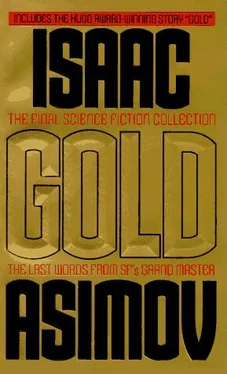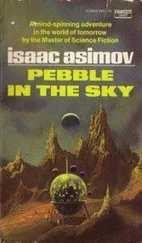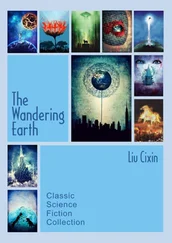Isaac Asimov - Gold - The Final Science Fiction Collection
Здесь есть возможность читать онлайн «Isaac Asimov - Gold - The Final Science Fiction Collection» весь текст электронной книги совершенно бесплатно (целиком полную версию без сокращений). В некоторых случаях можно слушать аудио, скачать через торрент в формате fb2 и присутствует краткое содержание. Год выпуска: 2003, ISBN: 2003, Издательство: Eos, Жанр: Фантастика и фэнтези, на английском языке. Описание произведения, (предисловие) а так же отзывы посетителей доступны на портале библиотеки ЛибКат.
- Название:Gold: The Final Science Fiction Collection
- Автор:
- Издательство:Eos
- Жанр:
- Год:2003
- ISBN:ISBN: 0-060-55652-8
- Рейтинг книги:3 / 5. Голосов: 1
-
Избранное:Добавить в избранное
- Отзывы:
-
Ваша оценка:
- 60
- 1
- 2
- 3
- 4
- 5
Gold: The Final Science Fiction Collection: краткое содержание, описание и аннотация
Предлагаем к чтению аннотацию, описание, краткое содержание или предисловие (зависит от того, что написал сам автор книги «Gold: The Final Science Fiction Collection»). Если вы не нашли необходимую информацию о книге — напишите в комментариях, мы постараемся отыскать её.
Gold: The Final Science Fiction Collection — читать онлайн бесплатно полную книгу (весь текст) целиком
Ниже представлен текст книги, разбитый по страницам. Система сохранения места последней прочитанной страницы, позволяет с удобством читать онлайн бесплатно книгу «Gold: The Final Science Fiction Collection», без необходимости каждый раз заново искать на чём Вы остановились. Поставьте закладку, и сможете в любой момент перейти на страницу, на которой закончили чтение.
Интервал:
Закладка:
He shrugged his shoulders and walked away without offering to take the dictionary. He was bright enough to get the point.
There are times, though, when I wonder how well any story of mine would survive what one might call the “Road to Xanadu “ test. (There’s no point in offending fellow writers by analyzing their originality, so I’ll just stick to my own stuff.)
The most original story I ever wrote in my opinion was “Nightfall,” which appeared back in 1941.
I had not quite reached my twenty-first birthday when I wrote it and I have always been inordinately proud of the plot. “It was a brand-new plot,” I said, “and I killed it as I wrote it, for no one else would dare write a variation of it.”
To be sure, it was John Campbell who presented me with the Emerson quote that began the story:
“If the stars would appear one night in a thousand years, how would men believe and adore; and preserve for many generations the remembrance of the City of God-” and it was Campbell who sent me home to write the reverse of Emerson’s thesis.
Allowing for that, the development and details of the story were mine-or were they?
In 1973, I was preparing an anthology of my favorite stories of the 1930s (the years, that is, before John Campbell’s editorship, so that I named the book Before the Golden Age) and I included, of course, Jack Williamson’s “Born of the Sun,” which had been published in 1934 and had, at that time, fascinated my fourteen-year-old self. I reread it, naturally, before including it and was horrified.
You see, it dealt in part with a cult whose members were furious at scientists for rationalizing the mystic tenets of the believers. In an exciting scene, the cultists attacked the scientists’ citadel at a very crucial moment and the scientists tried to hold them off long enough to get their task done.
I can’t deny having read that story. After all, I still remembered it with pleasure forty years later. Yet only six and a half years after reading it, I wrote “Nightfall” which dealt in part with a cult whose members were furious at scientists for rationalizing the mystic tenets of the believers. In an exciting scene, the cultists attacked the scientists’ citadel at a very crucial moment and the scientists tried to hold them off long enough to get their task done.
No, it wasn’t plagiarism. For one thing I wrote it entirely differently. However, the scene fit both stories and having been impressed by it in Jack’s story, I drew from memory, and used it in my own story automatically-never for one moment considering that I wasn’t making it up out of nothing but had earlier read something very like that scene.
I suppose that any thoroughgoing scholar who was willing to spend several years at the task could trace almost every quirk in “Nightfall” to one story or another that appeared in the science fiction magazines in the 1930s. (Yes, I read them all.) Naturally, he could do the same for any other story written by any other author.
Here’s something even more curious. In a note dated June 27, 1985, a reader sent me an enclosure-a photocopy of a short article from the October 1937 issue of the magazine Sky (now known as Sky and Telescope, I believe).
The article is entitled “If the Stars Appeared Only One Night in a Thousand Years.” It begins with the Emerson quotation and it is by M. T. Brackbill. The author describes what it might be like if the night on which the stars appear were coming. There might be “prostellarists” who believe the stars are coming; and “antistellarists “ who dismiss the whole thing as a fable. And then the night comes and everyone stares entranced at the stars and finally watches them disappear with the dawn, sadly realizing that for a thousand years they will never be seen again.
It’s rather touching, and about the only thing Brackbill misses, that I could see, was the certainty that on that particular night there was bound to be a heavy night-long overcast in various parts of the world, so that millions of people would invariably be disappointed.
The person who sent me the photocopy accompanied it with this note: “Dear Mr. Asimov-I happened to spot this article. I wonder if it was an inspiration for one of the greatest short stories ever written! “
Just an “inspiration“? If the article and “Nightfall” were carefully studied and compared, how many events and phrases in the story might seem to have been inspired or hinted at in the article. I haven’t the heart to do this myself and I hope no one else does.
Unfortunately, neither the name nor address of the person who sent me the article was on the note, and the envelope the whole thing had come in had not been saved. (Please, everyone, if you want an answer, put your name and return address on your letter and not just on the envelope. I frequently discard envelopes without glancing at them except to make sure they are addressed to me.)
In any case, I couldn’t answer him. So I must use this editorial as the only way of reaching him.
The truth is that I never saw the article; never had a hint that it existed until the day I received the note and enclosure from my unknown correspondent. It had not the slightest iota of direct influence on my story.
But John Campbell presented me with the Emerson quote and the request that I reverse it, only three years after the article had appeared. Had he seen it?
I wouldn’t be surprised if he had, and if, as soon as he had come across it or had had it drawn to his attention, copied down the quote and then waited for the first unwary science fiction writer to cross his threshold. (How thankful I am that it was I.)
Were he still alive (he would only be seventy-five today, if he were), I would ask him about it. I am quite sure, though, what his answer would be. It would be, “What difference does it make?”
So there arises the question: “If it is impossible to be completely original, how can you tell permissible influence from plagiarism?”
Well, it depends on the extent and detail of the borrowing. Based on that, it is possible to tell! It may not always be provable in a court of law, but, believe me, it is possible to tell!
Book Reviews
I have never made any secret of the fact that I dislike the concept of reviews and the profession of reviewing. It is a purely emotional reaction because, for reasons that are all too easy to work out, I strongly dislike having anyone criticize my stuff adversely.
I don’t think I’m alone in this. From my close observation of writers (almost all my friends are writers) they fall into two groups: 1) those who bleed copiously and visibly at any bad review, and 2) those who bleed copiously and secretly at any bad review.
I’m class one. Most of my friends aim at class two and don’t quite make it and aren’t quite aware that they don’t make it.
Unfortunately, there’s no way in which one can get back at a reviewer. I have sometimes had the urge to do some fancy horsewhipping in the form of a mordant letter designed to flay the reptilian hide off the sub-moron involved; but, except in my very early days, I have always resisted. This is not out of idealism but out of the bitter knowledge that the writer always loses in such a confrontation.
Instead, then, I take to muttering derogatory comments about reviewing and reviewers in general.
But I’m in a bad spot here. This magazine (which is the apple of my eye) not only has a regular book review column, but has other items, less regularly included, that review one or another of the facets of the science fiction field. If I really despise reviewing so, why is it I allow reviewing in the magazine?
Because I don’t really despise reviewing and reviewers. That is an emotional reaction that I recognize as emotional, and therefore discount. I am a rational man; I like to think; and in any disagreement between my emotions and my rationality, I should hope it is rationality that wins out every time.
Читать дальшеИнтервал:
Закладка:
Похожие книги на «Gold: The Final Science Fiction Collection»
Представляем Вашему вниманию похожие книги на «Gold: The Final Science Fiction Collection» списком для выбора. Мы отобрали схожую по названию и смыслу литературу в надежде предоставить читателям больше вариантов отыскать новые, интересные, ещё непрочитанные произведения.
Обсуждение, отзывы о книге «Gold: The Final Science Fiction Collection» и просто собственные мнения читателей. Оставьте ваши комментарии, напишите, что Вы думаете о произведении, его смысле или главных героях. Укажите что конкретно понравилось, а что нет, и почему Вы так считаете.











